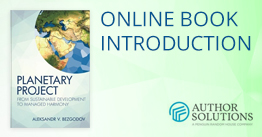CONCEPT OF MANAGED HARMONY
The Concept of Sustainable Development has been popularized and developed for several years, but it has not shown sufficient effectiveness or resulted in macropolitical, macroeconomic and macrosocial changes that would make a genuine contribution to solving global problems, especially preventing a global environmental catastrophe.
The concept developed within the framework of the Planetary project has been called the Concept of Managed Harmony. Analysis and criticism of the Concept of Sustainable Development, has brought us to a review of a number of tenets of the theory, and a realization of the necessity to considerably modernize it and further develop its correct ideas.
The concept of “harmony”, as a philosophical category, implies consonance and balance of diverse and even opposing elements as many in one. The word “harmony” is of Greek origin, and it carries the idea of integral wholeness of all living things in the cosmos. This can be possible only due to the internal reasonable order that is capable of being grasped by the human mind. Harmony keeps things in wise agreement in the world. This agreement is accessible to human understanding, and is the opposite of chaos.
The dialectical relationship of chaos, cosmos and harmony in the philosophical tradition of Ancient Greece described systematicity and manageability vs accidentalness and shapelessness as development stages of nature and society. Later, harmony started to be applied to characterizing and evaluating regularities, commensurate combinations, consistent dynamics and managed systems. The concept of harmony includes the idea of the identity of thinking and being, at least in the sense that the orderliness of thinking is possible due the orderliness of nature.
In our view, to apply the concept of “harmony” to social reality is relevant if only due to: the existence of such institutional mechanisms of enforcing social order through human activity as education, morality and law; as well as to such macrosocial mechanisms as democratization, progress, and cross-cultural relations.
The Concept of Managed Harmony can underlie the paradigm of planetary world order and noospheric civilization.
Unlike the Concept of Sustainable Development it is characterized by:
- A different understanding of the process of development and its current requirements;
- Identifying development driving forces;
- Solutions to administer the processes of harmonious development in terms of schemes, mechanisms and methods.
The ultimate goal of the Concept of Managed Harmony is the creation of a noospheric civilization based on resource substitution production, creative economy and biocompatible culture while WE-humanity and the integrated people will be its agents. The strategic prospect is revealing human cosmic potential, implementing human planetary mission to explore actively outer space. Managed harmony will be the paradigm of advancement in these directions and at the same time the form of existence for post-crisis humanity and the planetary community.
CONCEPT OF MANAGED HARMONY (Page II)
The strategic prospect is to reveal the cosmic potential of people and realise their mission of active space exploration.
From the perspective of the Planetary Project, the Concept of Managed Harmony is a paradigm of moving towards global human integration and realizing humanity’s planetary mission, as well as the form of being for post-crisis people and the planetary community.
The name itself makes it clear that our concept of planetary development purposefully and consciously emphasises and strengthens the following key points of civilization development:
- Goal-orientedness, integration and synchronicity;
- Comprehensive and systemic character;
- Centralized manageability;
- Balance, co-ordination and regulation.
Today, we cannot really talk about any development of society and civilization if we do not meet the key condition for any further development of the human species on this planet. This key condition is solving global problems, and saving the biosphere as a natural habitat of humans and other living species. This is impossible without global human integration, and the creation of a biocompatible economy and noospheric culture. As the essential, vitally important objective of humanity is to save itself and solve global problems, humanity must, in essence, transform public development into anti-crisis management through the use initially of available planetary resources, and transform existing global governance institutions into the system of planetary governance institutions. This would entail creating new effective instruments for solving global problems.
Planetary crisis management is a transitional stage from the current systemic crisis of the global world, to managed harmony of a new planetary world. Thus, we understand world development harmonization quite clearly as a centralized and purposeful process implying:
- An active role of contemporary humanity especially of its progressively minded public, constructive civil society institutions, scientists and public figures, as well as spiritual and political elites;
- Comprehensive development and implementation of effective economic, political-legal, technological, information-communication, cultural instruments of global problem solving;
- Optimization of the use of natural resources, transition to natural resource-saving and resource-substitution production, consumption, disposal and waste management;
- Construction of an integral creative economic system based on re-distribution of planetary rent income and other planetary asset liquidity (including regulating and compensating economic growth);
- Providing financial-economic and other resources for the system of planetary governance institutions formed partially through reforming and modifying existing global institutions (e.g. the UN), but largely through creating qualitatively new bodies;
- Improving the health of the environment, reconstructing damaged ecosystems, reviving plant and animal species that are now on the brink of extinction;
Consistent and systemic approach to the Sixth Techno-economic paradigm using large-scale innovation policy and mass implementation of breakthrough technologies.
CONCEPT OF MANAGED HARMONY (Page III)
The Concept of Managed Harmony implies: activating people as constructive planetary process agents; their evolutionary involvement in correcting historical mistakes; and therapy of their “development diseases” that cause suffering to the environment, which is the biosphere where they belong. As an anti-crisis manager of their own destiny, modern people should not wait for the right moment or the mercy of the higher forces, the cosmos or providence. The moment is here; and we have neither the luxury nor right to leave our history unmanaged.
It is already in the phase of planetary anti-crisis management that we must start solving the problems of harmonious world design and public development. This must be done on a systematic basis in practically all spheres of the economy, environment and social policy. From the macro-level of global problems, we must move to the micro-level of the individual as the end consumer of re-globalized society wealth. From the Planetary Project and the Concept of Managed Harmony perspectives, we propose modernizing and augmenting UN statistical indexes. A social harmony indicator will be introduced based on the assessment of both the development levels of different social spheres, and the gap between them.
The proposed social harmony criterion must include three blocks: social, environmental and economic.
A suitable financial and economic base should be in place to introduce real and radical changes: policy and education on their own are not sufficient. If it is to be effective, harmonizing management should have a solid foundation in the economic instruments. In other words, their objective sustainability quality will depend on the level and influence of normative-legal, administrative, cultural and information management instruments.
Concerning our understanding of social driving forces and managed harmony administrators, we would hesitate to pass categorical judgment about the entire humanity when our civilization faces the most comprehensive crisis it has ever faced. This notion seems problematic to us now due to the lack of unity and solidarity in people today.
At the current stage of the systemic civilization crisis and the deepening of global problems, from the Planetary Project perspective, we see the anti-crisis management potential in the elites alone: national, regional, continental and international elites. By the term elites, we do not mean specific small or closed club-like organizations, but the best representatives of communities, organized by professional, party, cultural or any other principle. It is important that they would clearly understand global problems, risks and threats humanity faces today. They believe in the necessity to save nature, people and society by all acceptable modernizing means, breakthrough technologies, and legal and economic instruments. They realize that humanity must unite to be able to achieve this goal. Indeed, elites formed by this principle (to be more exact, existing elites, especially scholarly communities) can act as drivers of a new – managed – type of global development. What is left is to integrate them themselves and to give them a clear systemic vision of planetary resources and the mechanisms of their use, all of which is the goal of the Planetary Project.
CONCEPT OF MANAGED HARMONY (Page IV)
Unfortunately, we can talk about “humanity” in its biological sense rather than in its political, social or cultural senses. Humanity is a phenomenon that can realize its potential only at the planetary level. It is yet to be born and faces the threat of its own demise. There are very many prerequisites but only one chance for it to happen. This is what is needed to realize that chance:
- A united mobilising planetary integration ideology;
- A correct, balanced, compromise-based strategy for all participants;
- Effective instruments of communication, organisation and management;
- Sufficient financial, legal and political resources;
- A well-adjusted system of administrative institutions;
- High technologies for all project infrastructures;
- Monitoring and regulation at all stages.









